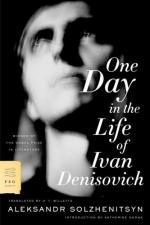|
|
One Day in the Life of Ivan Denisovich Topic Tracking: Work
Section 1
Work 1: Work is the main activity in the life of Ivan Denisovich and the rest of the prisoners and therefore, an important theme. The setting of the story is a Siberian labor camp where the bulk of the prisoners' time is devoted to doing work. Ivan Denisovich is especially occupied with work, always busy with odd jobs here and there to "earn" food or favors. Instead of being burdened by work, Ivan Denisovich actually considers it a way to pass time and occupy his mind. However, he also knows that to last in the labor camps, he must be able to discern when to work hard and when to take it easy. Ten years in a labor camp can easily wear out even the strongest of workers.
Section 2
Work 2: As the prisoners march to their work sites, Ivan Denisovich thinks about his home village where he has learned that the men have abandoned working in the collective farms and many have turned to a new craft, carpet painting. He finds it hard to believe that they would give up the traditional work of farming and carpentry for a gaudy trade, no matter how profitable. Although his wife wants him to take up carpet painting when he is released, Ivan Deniosvich feels that he should work with his hands as a carpenter or repairman. For him, work should make you feel that you earned your wages.
Work 3: Ivan Denisovich has learned over the eight or more years he has been in the labor camps how to take advantage of every little thing--even eating. Food is an important element in the story because it provides fuel for the prisoners to work. Prisoners are fed well at breakfast so that they can work hard during the day. Supper is usually thin stew because the prisoners are concerned more with sleep than food. Ivan Denisovich remembers how much he used to eat in his village in comparison to the camps. But he has done so much more work in the labor camps because he has learned to maximize the nutrients of even the paltry food he gets.
Section 3
Work 4: Work is intimately related to life. The half-completed building is said to come to life because the 104th resumes working on it. The work reports that the squad leaders haggle over are important because they determine how much work the labor camp produces, which is related to how much the camp gets paid. This filters down to the prisoner's bread ration, which for him is life. In addition, work allows the prisoners to get through the day. Work makes the days go by quickly.
Section 4:
Work 5: When Tiurin, the squad leader of the 104th, calls the men back to work, they all get up quickly to take their positions. A squad is like a family and in order for work to get done, every member needs to contribute. Ivan Denisovich is considered one of the best workers in the squad because he is always ready to do his job. But even the unwilling ones must work hard because getting things done entails teamwork and cooperation. Squads that work well together are the successful ones.
Section 5:
Work 6: Ivan Denisovich is considered one of the best workers because he has a positive attitude toward his work. He remains to finish the day's work on building the walls and before he leaves, looks it over to examine its quality. He takes great pride in a job well done. It is also his nature to make the most out of everything and not waste anything. This makes him persistent and energetic in everything he does.
Section 7:
Work 7: Ivan Denisovich has accepted his condition in life and therefore, he is the consummate labor camp prisoner. As long as he is able to eat, sleep, and carry on, he is content with his situation, no matter how unfair. And he is not envious of the trusties, who have easy office jobs. Rather, he identifies with the old prisoner, U 81, who has been working hard labor for years, but has maintained a cool, reserved dignity. For Ivan Denisovich, this old man is the model prisoner.
Section 8
Work 8: Ivan Denisovich buys tobacco with the money he earns from doing odd jobs for wealthy prisoners, such as making slippers or patching up clothes. All these skills allow Ivan Denisovich to get by in the camp without the need of packages. In contrast, Tsezar, the intellectual, can only get by because he receives two parcels a month. According to Ivan Denisovich, in a labor camp, the ability to work and do various things is more valuable and honorable than greasing palms and relying on others.




